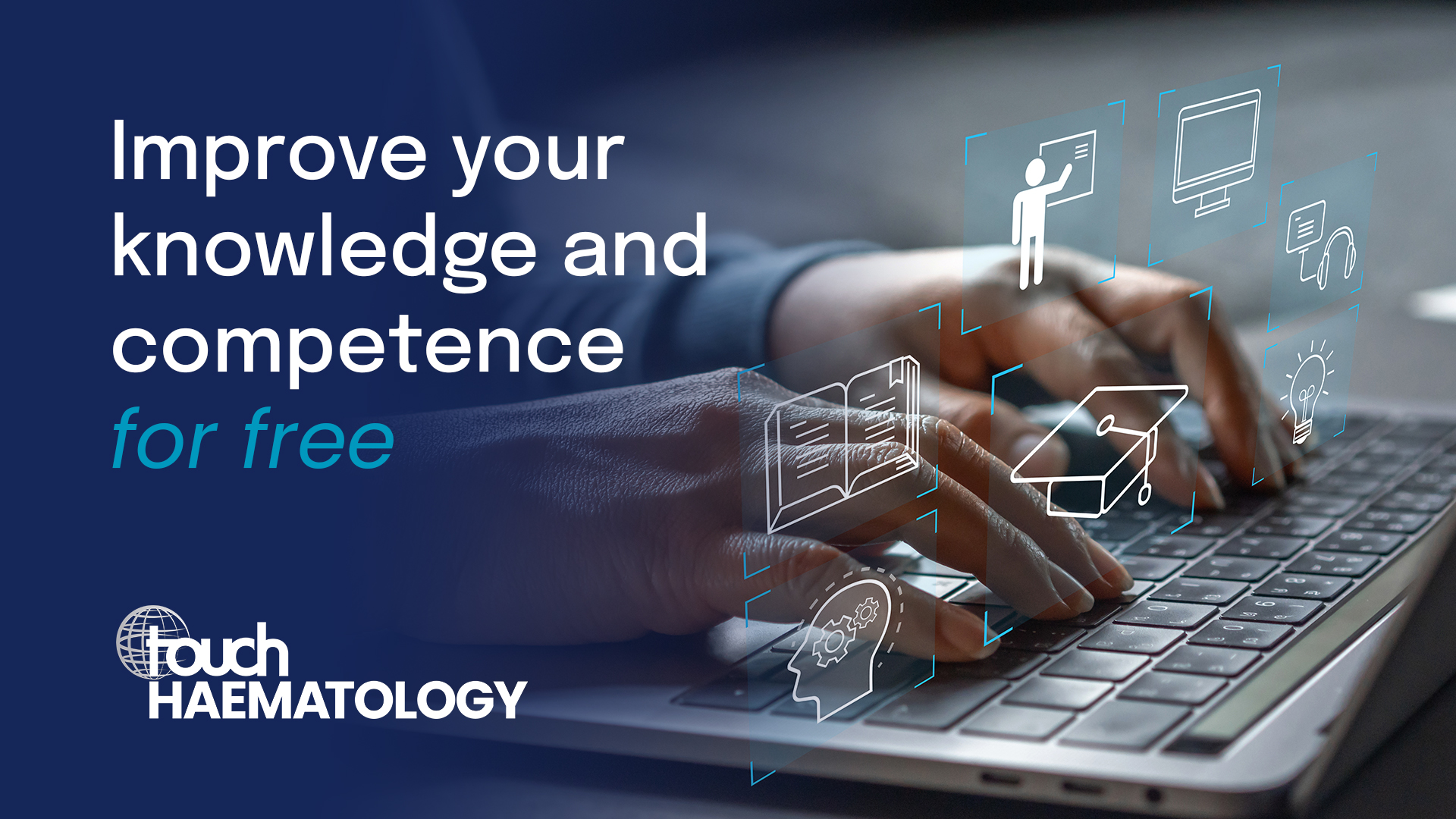This interview features Dr Nico Gagelmann (University Medical Center Hamburg-Eppendorf, Hamburg, Germany) and Dr Claire Horgan (Royal Manchester Children’s Hospital, Manchester, UK) co-chairs of the European Society for Blood and Marrow Transplantation (EBMT) Trainee Committee. Together, they discuss their motivations for pursuing careers in bone marrow transplant and cellular therapy, the evolving challenges young haematologists face and the pivotal role of mentorship in their journeys. They also delve into the objectives of the EBMT Trainee Committee in fostering collaboration, harmonizing training and enhancing access to education for hematology trainees across Europe and beyond.
Questions
1. What inspired your decision to specialize in BMT and cellular therapy?
2. What do you think are the biggest challenges facing young haematologists today?
3. What are the main objectives of the EBMT Trainee Committee in supporting young haematologists?
4. How important has mentorship been in your early career as a haematologist?
Transcript
Nico: My name is Nico Gagelmann from Hamburg, Germany. I’m a resident physician at the University Hospital here. I’m the current co-chair of the EBMT Trainee Committee and involved in training activities in Germany and Europe.
Claire: Hi. I’m Claire Horgan, a consultant pediatric haematologist at Royal Manchester Children’s Hospital and outgoing co-chair of the EBMT Trainee Committee.
Q1. What inspired your decision to specialize in bone marrow transplant and cellular therapy?
Claire: I think for me it was seeing children be diagnosed with these life threatening conditions, following them through the transplant work-up, through transplant, seeing them get unwell as part of that process, but then seeing them come out the other side and actually the life-changing impact that transplant and cellular therapy have had, that really made me interested in the whole science behind it.
And, actually, it’s a specialty that’s very research driven. It’s constantly changing even in the coming-up-to 8–10 years since I’ve been in the field. It’s changed significantly, and we’re always learning. We’re always finding different ways to adapt and make transplant and cellular therapy safer and better. And really it was that following the patients through the whole of their journey; diagnosis, treatment, long-term outcome, and just seeing these children be able to grow up and get on with their lives and achieve their own ambitions was behind my interest in the subject.
Nico: Well, starting out in hematology and especially in transplant cellular therapy was completely by coincidence. I have a friend who suggested to do an internship in the transplant unit here in Hamburg. She lost her husband, actually, on the ward, but was so amazed by the nurses, but also by the physicians’ research that happens there and told me that I have to go there to learn and practice and help people. And during that period, I actually wasn’t sure if I wanted to do it. But, over the years, I really saw that transplant cellular therapy has such a potential and is such a life-saving event for so many people giving hope, but also facing a lot of challenges with mortality, morbidity.
But the potential is really, really amazing. And I think, especially in haematology, this is completely unique, this situation we are in at the moment. So we have a lot of hope. We have a lot of future ahead of us, a broad future, a lot of challenges, but that’s the perfect scenario for developing research, education and training situations across Europe, and across the world, actually.
Q2. What do you think are the biggest challenges facing young haematologists today?
Claire: I think there are a number of challenges working (some of this will depend on where you where you’re based, what country’s health system) but I think, increasingly, young hematologists are having to train and work in overstretched departments, and it can be really difficult to actually train and learn more about the specialty, take opportunities for research and projects when there’s a service to provide.
The patient workload is huge. Patients are becoming more complex, and we’re having to do more for individual patients. So I think really trying to get the balance between training, providing the service can be a challenge for young hematologists. I think, one of the other things are the different training pathways, and how that varies across different international settings. For something that is as research driven as hematology, it can be really difficult to collaborate or to try and collaborate across with other trainees working in different countries because the training pathway is so different.
Particularly when we’re thinking about transplant and cellular therapy, you’ll have some people who have come at it from a very hematology, almost laboratory background. And then, in other areas of the world, it’s more of a sort of clinical oncology, leukemia type background, that people have followed. And it’s just trying to come up with common grounds that makes collaborating easier. And, actually, ultimately, we need to work on this because transplant and cellular therapy is a discipline that combines all of these elements and how we can develop curriculums across different international organizations will be a good part of this to ensure that everyone at least will have the same basic training.
Q3. What are the main objectives of the EBMT Trainee Committee in supporting young haematologists?
Nico: So the EBMT Trainee Committee actually has, if you will, three main pillars. So the first one is network, obviously. So, in transplant cellular therapy, until most recently, the network for trainees, fellows, young colleagues, MET students was quite heterogeneous. And what we aim to do is to try to build a platform to give a network for people across Europe, not only in Germany, France, Spain, Italy, the typical countries where research and education happens, but also for Eastern Europe, but more Southern Europe, North Europe, to really give a whole European network platform for trainees across Europe.
The other one is training. We experienced that training in Europe is completely heterogeneous when it comes to hematology transplant cellular therapy. And especially with upcoming cellular therapies. The huge challenge of inequality to access and training, resources in that new era of cellular therapies is really, really important to try to harmonize, to learn from each other, to give access.
And this brings us to the third one, and this is access. Access to the society, access to resources, access to education. And this altogether, I think, combines what the training committee stands for is complete openness for everyone and challenging actual principles and practices to try to show the world that training at the moment in haematology is completely evolving, and we need to adapt that and listen to the to the trainees and fellows what they actually think we should do to overcome the challenges in the next decade.
Q4. How important has mentorship been in your early career as a haematologist?
Claire: I think mentorship is a fundamental part of any young haematologist particularly wanting to pursue a career in transplant and cellular therapy. It is such an evolving field. It’s such a research-driven specialty. And, actually, it was for me working with Professor Rob Wynn here in Manchester as a pediatric SHO on the transplant unit all those years ago that really developed my interest and enthusiasm for the specialty. I ended up moving to a different part of the country to do my haematology training, but, actually, I think that only further developed my interest by seeing different settings as part of the training here in the UK. Despite the fact I’m a pediatrician, we have to do training in adult hematology, and I was really grateful to a great group of colleagues there. And it was actually there that I was encouraged to get actively involved within the EBMT as an organization. And I think for me, that’s also served as a platform to further develop my own career as a haematologist and maintaining the close links I had here with the team in Manchester has given me further opportunities for research and my own career advancements as well as linking with collaborative networks internationally, which I think is essential for this a research driven field like hematology.
I hope that given the mentorship that I’ve had and where I am today (I’ve just turned consultant, I’ve got a hell of a lot more to learn) but I hope that I’ll be able to mentor and help others in the way that I’ve been helped to achieve their career goals and ambitions. And I think that was a big driving force behind us setting up the EBMT Trainee Committee because what we did recognize was actually for such a global organization, there wasn’t a specific platform for trainees within that, and we really wanted to provide a network where trainees could be given opportunities to link in with each other and as well as providing educational resources and making things easier for them moving forward.
For more info on the EBMT Trainee Committee click here
This interview was facilitated by the European Society for Blood and Marrow Transplantation. No funding or fees were associated with the production of this video.
Disclosures: Nico Gagelmann and Claire Horgan have no financial or non-financial conflicts of interest to declare in relation to this video.
Interviewer/Editor: Sophie Nickelson
Cite: Gagelmann N, Horgan C. Empowering young haematologists: Insights from the EBMT Trainee Committee co-chairs. touchHAEMATOLOGY. December 3, 2024.
SIGN UP to touchHAEMATOLOGY!
Join our global community today for access to thousands of peer-reviewed articles, expert insights, and learn-on-the-go education across 150+ specialties, plus concise email updates and newsletters so you never miss out.
Click here to REGISTER NOW >>>




